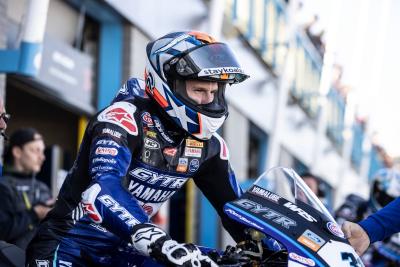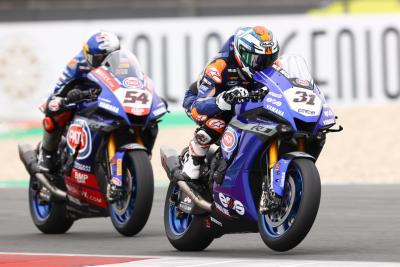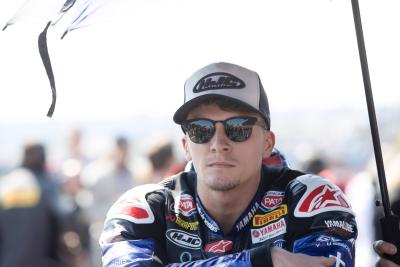EXCLUSIVE: How Gerloff turned the evils of death threats into his force for good
We all know sports can be dangerous.
Pulled ligaments, broken limbs, trauma… even a sport as sedate as snooker isn’t immune from the odd strained neck and torn, erm, trousers. In short, the competitive pursuit of sporting greatness can wreak havoc on one’s body (and stitching).
In the proverbial deck of sports’ injury Top Trumps, of course motorcycle racing scores particularly highly. But while the physical costs of each sport certainly varies, when it comes to matters of mental health, then there is every chance a WorldSBK rider and a snooker player can strike more common ground.
On track, the perils are very obvious. As riders are correct to point out, they are risking their health (and lives) each time they go out on track to engage in a high-speed, high-stakes pursuit of limit pushing… while dicing wheel-to-wheel with dozens of others doing exactly the same.
But while the physical risks of actual racing have forever been an ever-present inevitability, riders are increasingly coming up against the threat of a newer danger to their health, one that might not leave them battered and bruised in hospital but can certainly leave lingering scars out of sight.
It’s a tussle of mind over matter that GRT Yamaha WorldSBK rider Garrett Gerloff knows only too well after a handful of ill-timed, high-profile run-ins with other riders during the 2021 season not only shook his confidence, but did so under the unforgivingly harsh spotlight of peer indictment and social media critique.
"I never wanted to be in any of these situations to begin with,” he tells Crash.net in an exclusive interview. “Then it happens and then you keep finding yourself in that situation, it leaves a lot of questions.
"That was affecting me more than anything - why did it happen in this sequence and how can I avoid it happening again?"
In what has been a rollercoaster 12 months for the Texan, both competitively and emotionally, I first interviewed him during the Donington Park round of the 2021 WorldSBK season at the precise moment his career appeared to be on the ascent.
Debuting in 2020 after making the (increasingly rare) transition to WorldSBK from MotoAmerica, Garrett may have started the year as a relative unknown, but he ended it as a welcome, podium-winning revelation. After picking up where he left off in 2021, his profile then gathered speed on the back of a keenly-observed MotoGP debut at Assen aboard the Petronas SRT Yamaha.
With a new Yamaha WorldSBK contract firmly tucked into his back pocket too, if I’d had the foresight to ask Garrett ‘how’s your head?’ back then, the response might well have been ‘on top of the world’.
On his return to Assen, however, the thrust in his momentum spluttered and he was brought down to earth with a bump, quite literally.
Sentenced in the trial by social media
They say the biggest cardinal sin a racer can make is to take yourself and your team-mate out of the running. Even so, Garrett’s collision with Toprak Razgatlioglu - his title-contesting Yamaha factory stablemate - stung as a multi-faceted faux pas that embarrassed his employers, hampered the rider he was supposed to be supporting and perpetuated a newfound notion that he was too aggressive on track.
Internally, Yamaha top brass activated their finest stoicism as Razgatlioglu - in a rare display of what was still fairly tempered emotion - pointed fingers as his ‘big, stupid’ mistake.
"It was difficult. There’s no nuance when it comes to an outside perspective… I knew what happened but I was like ‘what the hell?’
"I never wanted to be in those positions in the first place, but I was walking on eggshells and I didn’t want it to happen again, neither did Yamaha."
Racing incidents and reactions are par for the course, of course, so it wasn’t long before contrite apologies were made and accepted, riot acts were read, the news cycle rotated and the wronged parties moved on.
Externally, however, the backlash - while inevitable - came thick, fast and sustained. Indeed, within seconds of Yamaha fairings crunching into one another, trial by social media was soon in session presided by tens of thousands of self-appointed anonymous judges ruling on an error of judgement. In no time, gavels were brought down on the ‘post’ button to deliver vehement verdicts of ‘guilty’... in multiple languages, expressions and curses.
However, we’re not talking about withering put downs by the Judgiest of Judys, this was sinister abuse in its most shocking form, ranging from petitions towards Yamaha to fire him, to the hyperbolic branding of him as a ‘killer’, all the way to blunt threats being made on Garrett’s life in the most horrific manners (Ed: Death threats - that are now deleted - were shared off the record and are intentionally not published here)
"It can turn on you quick…" Garrett says with a sigh. "You mess up and you go from being a legend to being someone everyone wants to see die basically!
"I was getting some threats… I wasn’t worried, it was more ‘who are you people?’ Don’t you guys have other things to worry about? They are so quick to react off of an incident. It’s a situation I had never been in before."
Of course, cries of Garrett costing Razgatlioglu were both premature and wide of the mark, but while there are no charred bridges between the two riders involved today, he is frustrated at still being stigmatised by this mistake in a sport where they are not just inevitable, they are actively relished.
That said, while there is never a ‘good’ time for a crash, in Garrett’s case the timing was particularly ill. A collision with Jonathan Rea at the Aragon opener was followed by him rear-ending Michael Ruben Rinaldi in Estoril after getting his braking wrong on a bump off line.
While Rinaldi’s assertion of Garrett being an aggressive rider wasn’t a unanimously shared opinion among other riders initially, his subsequent clash with Razgatlioglu swayed the undecided.
Death threats aside, Garrett admits this chastising view from his respected peers actually made a bigger impact with him.
"It’s frustrating to hear people criticise you that aren’t inside the paddock when they don’t know you and you’ve never met them before, but it wasn’t random people that got me. It was more the reaction of people whom I knew and respected, some of the things they said caught me off guard and that hurt more"
Racing in the age of the ‘Insta-grab’
In an age of social media where anyone’s self-esteem can be boosted or shattered by comments beneath a post from people you’ve probably never met, when your day job is a sport that can be watched, shared and immortalised in copious clunky memes over and over, the shifting tides between vociferous validity and vicious vilification are never more than a few seconds away from being whipped into a tsunami.
"I have this quote, it’s stupid - from as Batman movie I think, but I’m going to say it anyway: ‘It’s better to die a hero than live long enough to become the villain’."
"I see things happen all the time in sports where I am like ‘ahh dude, what are you doing?’ but I was shocked people would go out of their way to tell you about it in such a brutal way on your social media.
"I won’t message Tom Brady if he goes for an interception and they lose the game because of it. It was just weird to me… why are they so angry?
While Garrett accepts social media is a necessary platform for himself, his team and the sport as a whole to engage with the fans and the wider public, he was alarmed to witness it developing into what can also be described as a ‘necessary evil’.
"It’s a double-edged sword," he continues. "This is the life I chose and I do want to be here racing with the best in the world and shit happens sometimes. This happens to be a public sport and it is what it is.
"But it was a pretty dramatic flip… I can only imagine being someone big. I am such a small fish on Instagram, I can’t imagine being a movie star or singer or someone who has any kind of attention like them.
"In the past there was TMZ or the news, but you were more disconnected from it then, compared to something in your pocket that ‘dings’ every time someone leaves you a message. You don’t know if it is good or bad until you look at it… it feels like you’re being mobbed for sure."
Mind games or mental health?
In a sport where games of the mind can be just as potent as a last lap lunge, mental health is a conversation that has been kept largely behind closed doors for myriad reasons.
After all, while a helmet may protect a rider on track, it won’t withstand impacts to a riders’ mental health off it.
Squinting through misty-eyed memories of decades gone by, it is easy to refer to earlier generations as being ‘made of tougher stuff’, a notion that sparks numerous comments about riders of today being too ‘soft’ or ‘sensitive’. But it’s an uneven comparison to make when fan interaction has transitioned from hanging over a fence to sliding into one’s DMs, while news outputs that were once committed to print days later are now an immediate and rolling churn of breakers, views and imagery.
So while riders of yesteryear could crash, dust themselves off and get their story straight in good time for deadlines, today’s competitor is left catching up to themselves as social media is flooded with block capitals, screengrabs and a collection of emojis before they’ve even realised which gravel trap they’ve landed in.
Indeed, it’s worth pointing out that we are now at the stage where the newer generation of competitors - such as Garrett, Andrea Locatelli and Iker Lecuona - have grown up with social media woven into their personal and professional lives, whereas the likes of Jonathan Rea and Alvaro Bautista will remember a time before TikTok and Snapchat.
While comments on Garrett’s social media profiles have simmered down a year on and are now more likely to attract ‘Stans’ (the slang term for fans - perhaps a touch obsessive - in a nod to Eminem’s, eponymous, ahem, admirer) rather than foster savage abuse, the 26-year old admits to easing back from inflating the importance of anonymous opinion in favour of values he can see and touch.
"I have never been in such a negative spotlight on social media before so going through it, you realise this isn’t the real world. You go through the process of deciphering how to go through it all.
"Social media is not the real world, what people say on there isn’t a reflection of who you are, it’s someone speaking from their own insecurity. You go through that process of realising where your values do come from. Criticism may be warranted sometimes, so I try and do everything with as much integrity as I can."
While the (unsolicited) trials and tribulations of social media can and are utilised for the powers of good, evil, funny and - quite often - just really really weird, as much as Garrett entertains the idea of leaning into a new bad boy image, he is instead simply sampling ‘social’ without the ‘media’.
"There is a part of you that just wants to flip off the world, be like ‘F You’ I’m gonna do me… it’s tempting!
"For sure, I have disconnected… and I try to monitor myself, I try to think before I speak, that’s just how I am."
Incidents happen quickly in motorsport but scars - visible and mental - can linger in a sport where the talking doesn’t just happen out on track anymore. Nevertheless, while there will always be bad chatter if you go looking for it, certainly more positive conversations are opening up too.
So Garrett, having neglected to ask you 12 months ago, I’ll ask you now ‘how’s your head?’
"Better," he concludes defiantly.
"That period gave me some motivation and I have done my best to funnel it into my goals and what I want to achieve.
"Yeah, I am definitely in a better head space."


_0.jpg?itok=1EeZ34CN)












